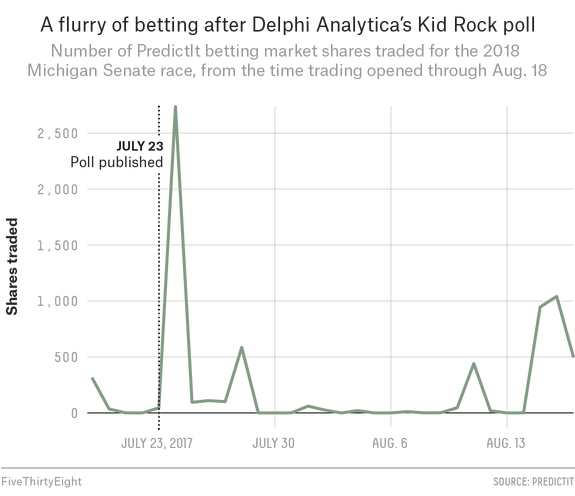The July poll that went viral on the Internet, lifting Kid Rock as a serious contender for U.S. Senate, may have been created by a fake polling firm to cash in on lucrative bets on the 2018 Michigan elections.
According to FiveThirtyEight, a series of numbers from the mid-July poll incredulously showed the raunchy musician from Romeo (Mich.) leading Democratic incumbent Debbie Stabenow by a 30-26 percent gap. That raised questions among political pros whether this whole episode was a scam.
First, the so-called polling firm, Digital Analytica, had existed for about a week prior to the highly publicized poll of July 14-18. Second, there are some indications that this shadowy group may be engaged in cashing in on an online gambling website, PredictIt, which offers the opportunity for betters to make wagers on political matters relating to future elections and the advancement of political figures.
Of course, in the old days of, say, the 1990s, a candidate with as much baggage as Kid Rock, with his many skeletons in the closet, would not be taken seriously by any Republican operative of any weight.
After all, this potential GOP nominee sang in a song lyric: “If I was president of the good ol’ USA, you know I’d turn our churches into strip clubs and watch the whole world pray.”
Yet, Digital Analytica saw an opportunity, through polling numbers, to create momentum, generate publicity, and provide credibility for a Kid Rock candidacy.
It worked. In an age of social media dominance, a celebrity trumped the field of three strong Republican candidates for Senate in Michigan.
In fact, the questionable polling results were exalted and shared on the Internet by right-wing sites such as the Daily Caller, Political Wire and Twitchy. Kid Rock himself shared an article from the lowly Gateway Pundit about the poll.
FiveThirtyEight’s Harry Enten offered this one huge caveat:
There was just one problem: Nobody knew if the poll was real. Delphi Analytica’s website came online July 6, mere weeks before the Kid Rock poll was supposedly conducted. The pollster had basically no fingerprint on the web.
Indeed, Delphi Analytica isn’t a polling firm in any traditional sense, and it’s not entirely clear they even conducted the poll as advertised.
The story of Delphi Analytica, its mysterious origins and its Kid Rock poll show that the line between legitimate and illegitimate pollsters is blurring.
Since the beginning of this political fiasco several weeks ago, Kid Rock (aka rich kid Robert Ritchie) has been routinely accused of using the poll as a publicity stunt to promote album sales and concert-ticket increases.
His fellow Michigan rocker/right-winger, Ted Nugent, said in recent days that, “He ain’t running for jack sh–.”
While this story is complex and layered, FiveThirtyEight offers an extraordinarily detailed analysis of the behind-the-scenes shenanigans.
When Enten of FiveThirtyEight first uncovered the dubious status of Delphi Analytica, he used the firm’s website and contacted a person using the name Jessica Lee. She wouldn’t provide the name of Delphi Analytica’s owner, the names of any of the other people working there, or even her own title.
Relying on a source well-versed in the world of PredictIt gambling, Enten discovered a person going by the online screen name “Autismo Jones,” who claimed to have started Delphi Analytica and bragged about the publicity the Kid Rock poll was receiving.
Enten writes:
“Jones” and whoever may have helped him or her did so for two reasons. The first, to gain notoriety and troll the press and political observers. … The second, to move the betting markets. That is, a person can put out a poll and get people to place bets in response to it — in this case, some people may have bet on a Kid Rock win — and the poll’s creators can short that position (bet that the value of the position will go down).
…Shares of the stock for Michigan’s 2018 Senate race (graph below) saw their biggest action of the year by far the day after Delphi Analytica published its survey.
Yet, polling pros immediately noticed some gaping anomalies in the survey numbers. In the July poll, Kid Rock leads Stabenow 26 percent to 18 percent among the meager 72 respondents in Detroit, for instance. While the margin of error on this small subsample is large and it’s certainly possible that a white rocker like Kid Rock would upset the normal electoral map, the results present a gigantic departure from past Detroit voting patterns. Hillary Clinton beat President Trump there 95 percent to 3 percent in November 2016.






